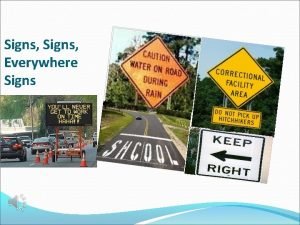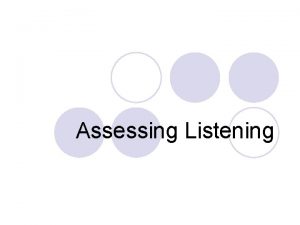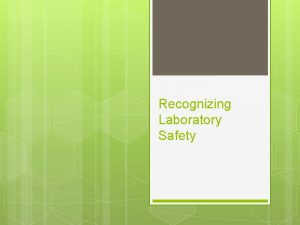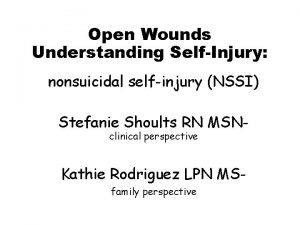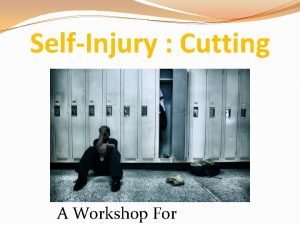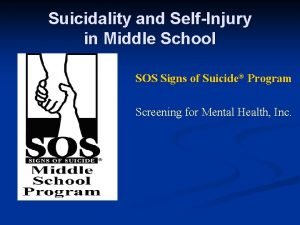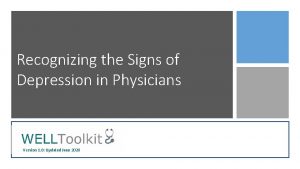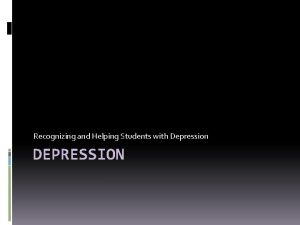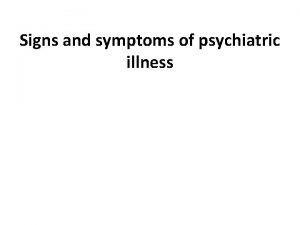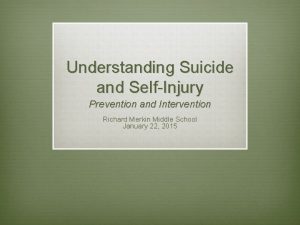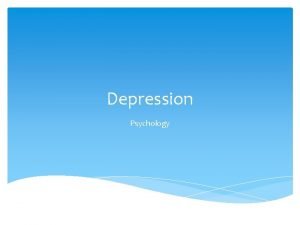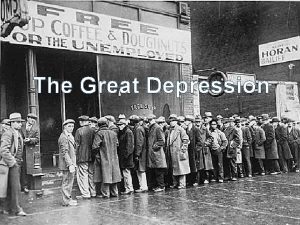Depression and SelfInjury Recognizing Signs of Depression Recognizing
















- Slides: 16

Depression and Self-Injury • Recognizing Signs of Depression • Recognizing Signs of Hurting Self or Others • Getting Help

What Do You Think? • How is a two-year-old (who falls in the middle of a pool and is drowning) like a teenager who is depressed or suicidal? – Both need someone to help them or they will die. – Both do not have the skills they need to help themselves. – As the child goes deeper into the water, so does the teenager get deeper into their depression. – Both can be prevented. – Both need professional help. Source: Deb Tackman, Outrageous Teaching Techniques in Health Education

• Depression is more than the “blues” or the “blahs. ” It is more than the normal everyday ups and downs. • Clinical depression is a medical condition. It is when feelings of sadness, hopelessness, and despair persist and interfere with a person’s ability to function. • Many adults and teenagers do not recognize the symptoms of depression in themselves or others.

• Depression affects people of all ages. • It will affect more than 19 million people every year. • Some people experience only one episode of depression in their entire life, but others may have several episodes of depression. • Depression can begin suddenly for no apparent reason, while others can be associated with a life situation.

Some causes of depression. • A loss • Inability to please one’s parents. • Not making a sports team. • Breaking up with girl/boy friend. • Argument with a friend. • Disagreement with a parent or family member. • Lonely • Changes in the brains’ chemistry (constant depression) 5

Signs and Symptoms of Depression. 1. Feelings of sadness, inadequacy, disappointment about the past, pessimism about the future. 2. Inability to enjoy yourself or your usual pleasures. 3. Persistent feelings of anger or wanting to start fights. 4. Feelings that you are worthless and behaving as though to prove it, e. g. , by doing things that are self-destructive, disturbing, offensive, or illegal. 5. Not taking care of yourself (eating poorly and overlooking grooming). 6. Feeling tired all the time without being sick. 7. Dreading mornings, dreading decisions, crying without knowing why. 8. Feeling helpless to change your life. 9. Feeling hopeless about the future. 6

Self – Hurting Behaviors • Self-injury is the act of • Self-injury often occurs deliberately destroying in secret – person hides body tissue, at times to the self-injury from change a way of feeling. others. • It is an intentional act, repetitive, and results in minor to moderate harm without the intent to cause death.

Self - Hurting Behaviors • • Cutting Burning Pin-Sticking Carving Scratching Branding Marking Head-banging • Picking and pulling skin and hair • Abrasions (scrapes of bruises • Biting • Hitting • Breaking bones • Tattooing • Excessive body piercing

Why Do They Hurt Themselves? § To escape from emotional pain, such as anger or anxiety § To release tension § To physically express pain § To express feelings of emptiness, loneliness, helplessness, worthlessness § An attempt to feel/be more in control § To protect themselves from pain § Not understood by others • To induce a pleasure state from the endorphins that are released

• Frequent or unexplained scars, cuts, bruises, and burns (often on the arms, thighs, abdomen) • Consistent, inappropriate use of clothing to cover scars • General signs of depression • Secretive behavior, spending unusual amounts of time in the bathroom or other isolated areas • Social or emotional isolation and disconnectedness • Substance abuse

• Possession of sharp instruments, (razor blades, thumb tacks, pins) • Indications of extreme anger, sadness, or pain • Images of physical harm in class or creative work • Extreme risk-taking behaviors that could result in injuries

What can parents and teenagers do about self -injury? • Accept reality and find ways to make the present moment more tolerable. • Identify feelings and talk them out rather than acting on them. • Distract themselves from feelings of self-harm (for example, counting to ten, waiting 15 minutes, saying “NO!” or “STOP!”, practicing breathing exercises, journaling, drawing, thinking about positive images, using ice and rubber bands) • Stop, think, and evaluate the pros and cons of self-injury • Soothe themselves in a positive, non-injurious way. • Practice positive stress management. • Develop better social skills.

Getting Help • One of the biggest problems with depression is that when one is depressed, hope is gone and asking for help seems impossible. That's why many depressed people never seek depression treatment. Without treatment, however, depression can get worse, even to the point of being lifethreatening. Your teenage years are a time of intense change and uncertainty, and to be confused and disappointed sometimes is absolutely normal. But depression can prevent you from enjoying and benefiting from this time in your life. Individual therapy, group therapy and antidepressants can help.

What Hinders. • Comparing yourself to others • Daydreaming • Skipping meals • Passively watching TV, reading, or listening to music • Watching video movies • Being all alone • Thinking about the past • Blaming others for how you feel Criticizing yourself Taking sleeping pills Avoiding friends Staying in bed Loafing Drinking alcohol (or using any drugs) • Doing something you would not normally think is a good idea, just to feel liked, admired, or appreciated by someone else • • • 14

What Works? • Setting realistic goals for yourself • Exercising vigorously • Cooking or cleaning • Remembering that everyone • feels "down" sometimes • Talking with a friend or counselor • Being active • Getting a job • Eating healthy meals • Shopping with friends • Participating in a church group • Talking with parents • Finding a new "hands on" hobby • Participating in family gatherings • Accomplishing anything (no matter how small) • Remembering that you have felt "down" before but it did not last forever

Giving Help • Let him or her know that you care and want to help. • Acknowledge that your friend has a problem and that the symptoms are serious. Ask about suicide. • Convince your friend to ask for help. This may include your talking to a trusted adult.
 Signs signs everywhere signs meaning
Signs signs everywhere signs meaning Conventional language
Conventional language What color means motorist services guidance
What color means motorist services guidance The octagon shape is used exclusively for
The octagon shape is used exclusively for Classify useful and harmful materials
Classify useful and harmful materials Observing trends in entrepreneurship
Observing trends in entrepreneurship An opportunity has four essential qualities it is
An opportunity has four essential qualities it is Recognizing opportunities and generating ideas
Recognizing opportunities and generating ideas Recognizing and resolving abo discrepancies
Recognizing and resolving abo discrepancies Communicative stimulus-response tasks
Communicative stimulus-response tasks Recognizing opportunities and generating ideas
Recognizing opportunities and generating ideas The listening wheel
The listening wheel Chapter 3 recognizing opportunity
Chapter 3 recognizing opportunity Recognizing genre - argumentative text
Recognizing genre - argumentative text Speak about variables affecting channel structure?
Speak about variables affecting channel structure? Recognizing lab safety worksheet answer key
Recognizing lab safety worksheet answer key Chapter 3 recognizing opportunity
Chapter 3 recognizing opportunity
